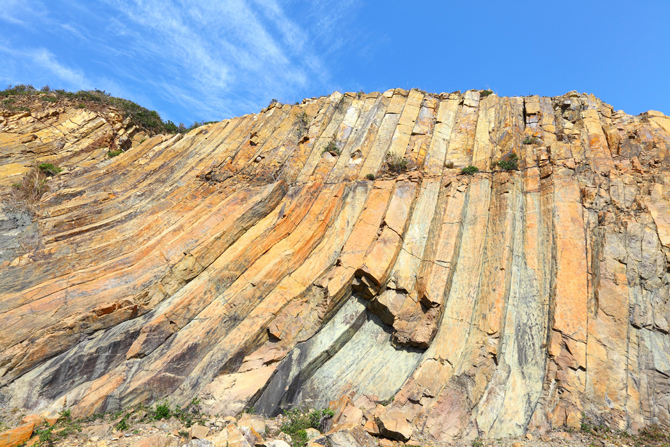

Behind the widely perceived image as a concrete jungle, Hong Kong is really a place of great geological wonders, according to Professor Chan Lung-sang, Department of Earth Sciences at the University of Hong Kong: "As a geologist, what interests me is not just the appearance of the rocks, but more importantly, the history conveyed by the rocks."
From Rock Appreciation to the Essence of Life
"What intrigues me about the historical background of rocks is how appreciating rocks can lead to the understanding of the natural wonders and the essence of life," said Professor Chan. "Think about it, with a metre's worth of rock taking thousands of years to form, the coastlines we know today could have been mountainous areas or lakes billions of years ago – isn't that amazing? The minerals in the rocks are like windows to the past – they are the clues to landscape changes and evolution of various species," said Professor Chan, who, in his retirement age, thinks rock appreciation has given him a discerning perspective of life. "With the passage of time, rocks markedly elaborate the comparison of the humble humans and the powerful nature. When a piece of rock can be millions of years old, while us humans only exist in this world for a matter of a few decades, as humans we should learn to take life easy, follow our heart and let life take its course."
"Rock appreciation is a fun activity fit for all ages, and one that costs little. Since most of the rock appreciation sites are located in the countryside, the activity is a great way to connect with the nature, relax your body and mind, and catch a breath of fresh air. While you're at it, be sure to pay attention to the patterns and bands of the rocks that strike resemblance to art pieces, or feel the dynamic force as the sea waves hit the rocks. Moreover, appreciating the rocks with like-minded individuals and friends alone itself is an activity that can benefit friendship and expand social life. In face of these magnificent rock walls, we often find ourselves pondering whether our generations some hundreds of years down would still get to see these geological wonders, and what rights us humans have to damage these natural landforms, which took millions of years to form, in a matter of centuries. Rock appreciation is also nature's course on environmental conservation, and the havoc man-made facilities such as cable cars or escalators have wreaked on the natural environment. Rock appreciation, in a nutshell, is an activity of multiple benefits."
Rock Appreciation Hot Spots and Things to Note
"Tung Ping Chau is a place of great geological value in Hong Kong, with a sedimentary rock strata that resembles an enormous book. Embedded in the rocks is the cyanobacteria, which was active three billion years ago but is hardly seen nowadays. It chronicles the landscape changes over a lengthy period, and is therefore something geologists never tire of. The rock formation at Wong Chuk Kok Tsui, in the north of Tolo Harbour, meanwhile, is believed to be 400 billion years old, and is hitherto the oldest stratum found in Hong Kong. Influenced by the folding and staggering actions of geological movements, the stratum is almost vertical and the sight is simply awe-striking," said Professor Chan, who would not skip a chance to observe research-worthy rocks, be them in Hong Kong or overseas countries, yet some locations may not be suitable for general rock appreciators. "The stromatolite at Shark Bay in the west of Australia, for instance, is nothing near splendid in appearance, but it is a rock type that garners immense interest among geologists."
On top of the 60 to 70 geological and rock appreciation field trips he leads every year, Professor Chan is also the tour guide for geological field trips organised by museums like the Hong Kong Science Museum and other organisations. "The gear for rock appreciation is pretty much like that for hiking – comfortable clothes, hiking shoes, hat, map and compass. Bring along your camera too if you're interested in capturing the landforms with photographs. Last but not least, respect the environment while appreciating rocks, which means not to take away anything from the environment, damage or deface the rocks."
Beginners to rock appreciation can sign up for guided tours by Hong Kong Geopark (www.hkr2g.net/b5_geotours.htm), Tai Po Environmental Association (www.taipoea.org.hk/tpgeopark), or other official institutions. "Retirees may even want to bring along their grandchildren or friends to rock appreciation and end the day with 'Geo Gourmet' (www.geopark.gov.hk/b5_s4a.htm) in Sai Kung!"
Special Thanks:
Professor Chan Lung-sang, Department of Earth Sciences at the University of Hong Kong